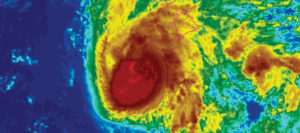 I know they say time flies when you get older – but really, where has this year gone? We are already well into May with another hurricane season upon us. Hurricane season officially begins June 1st and continues until November 30th. And it’s never too early to prepare.
I know they say time flies when you get older – but really, where has this year gone? We are already well into May with another hurricane season upon us. Hurricane season officially begins June 1st and continues until November 30th. And it’s never too early to prepare.
The 2017 hurricane season has been labeled ‘hyperactive and catastrophic’ by Wikipedia and, they reference the 2018 hurricane season as ‘above-average and damaging.’ So, what could be in store for 2019? Thankfully, predictions made by Colorado State University’s Tropical Meteorology Project suggest that we will have an average or below average hurricane season.
Nevertheless, we live in a hurricane-prone region, which requires certain precautions to protect our homes and ourselves.
Being a Texas girl, I had become accustomed to the dangers related to tornadoes, but my first experience with a hurricane was Irma in 2017. The devastation Irma caused followed closely by hurricane Maria taught me many things about hurricanes in somewhat of a ‘crash course.’ I was lucky; the worse thing I had to deal with was a weeklong power outage. Many others suffered far worse.
Hurricane Preparedness
There are many ‘Hurricane Safety Checklists’ available. I found a checklist on the Red Cross website that is very detailed. Checklists tend to outline how you should prepare once a storm is headed your way. But what can we do in advance, far before the storm track is determined, to prepare our homes and ourselves?
I think many of us suffer from the ‘It won’t happen to me,’ syndrome. Luckily, this is mostly true but it’s still not a fair gamble when the two most important things are at stake: life and home.
Beyond the normal batteries and extra water checklist, let’s concentrate on fortifying your home against the power of a hurricane.
Fortifying Your Home
Roof Straps and Clips
After Hurricane Andrew hit Florida in 1992, many in the home industry had to think about building codes and how to better protect the public. High Wind Standards were introduced in 1995, but it wasn’t until 2002 when Florida’s system was effective. By 2004 the International Building Code was in effect in Florida with some Florida specific aspects.
Based on the general life of a roof – most roofs that were put on a home prior to 2002 have been replaced, but that doesn’t necessarily mean your current roof has the protection it needs. Hurricane straps and clips that have been installed by way of retrofitting may not be installed correctly, leaving a homeowner with a false sense of security regarding their roof. Thankfully, insurance companies recognize the increased safety and durability that a properly secured roof provides and therefore offer attractive discounts on homeowner’s insurance for properly installed or retrofitted roofs. You can call virtually any Licensed Home Inspector in the State of Florida and request a Wind Mitigation Certification on your roof, which might save you money, or even better, save your roof!
Hurricane Shutters
I still remember what I was thinking when I first saw a truly fortified home here in Florida. With the push of a button, giant panels rolled down to cover the floor to ceiling windows of the home. I remember thinking how unattractive the roll-down shutters were. Flash forward to 2017 (seven years later) and I would have done just about anything to have those shutters on my own home. When you are during a storm, the idea of something crashing through your windows is beyond scary.
Not long ago, Florida building codes came to the rescue once again and required hurricane shutters for all new construction homes. But if you haven’t purchased a home built after 2012, you likely don’t have this protection. Instead, you are left battling the throngs of people trying to get into the local home improvement store to buy up plywood to hammer into the side of their house. There are several different levels of protection that can be added to any home: hurricane screens, hurricane panels, and hurricane shutters. Again, insurance companies respect the investment for these items and reflect it in attractive insurance discounts.
Oh No! The Waste Won’t Flow!
Hurricanes are accompanied by enormous amounts of rain. There are many issues Central Floridians face about heavy rain. One issue is the effect of heavy downpours on septic systems. I can’t imagine anything worse to deal with then a backed up septic system in the middle of a hurricane. Make sure your septic system is equipped with a backwater valve which will stop any sewage from backing up into your home. Prior to the hurricane season, it may be a good idea to have your septic system pumped and inspected. You can always add a backwater valve if you don’t already have one. A licensed plumber typically does this.
All I want for Christmas is a Generator! Hard-Lined that is!
As I suffered for days on end without electricity, all I could hear was the steady drone of my neighbor’s generator. I had neighbor envy – bad. I sat in the dark, imagining them in front of their TV with popcorn and cold sodas.
Generators are available for every budget. The most common generator is a gas-powered one that sits outside with extension cords running into the house to keep the most important items running. Most people use them to power up refrigerators or other smaller appliances. Sometimes there are greater risks involved with the loss of power that a standard generator simply cannot maintain. For those of us who use well water – the well pump is a terrible thing to be without.
Hard-Lined generator systems are a large, yet important investment. Costs for a whole house back-up system can range from $9000 to $15,000 (higher if you have more than one AC unit) according to Eau Gallie Electric. They go on to say, “If your home has natural gas, you will probably be at the lower end of the spectrum. If you require a propane tank, you will be at the higher end of the cost spectrum depending on how much run time you need (which determines the size of propane tank you need and the cost to initially fill it.)
Your Investments and Resale
All the items I have mentioned in this article provide a nice return on investment if/when you choose to sell your home. Be sure to keep records on when, how and who installed the item and keep up with any warranties that come with the item.
813-549-0870
www.tampahome360.com
Check Also
Hungry Heart
By Alex Anderson The songwriter and performer Bruce Springsteen was right when he wrote, “Everybody’s …
 Central Florida Health and Wellness Magazine Health and Wellness Articles of the Villages
Central Florida Health and Wellness Magazine Health and Wellness Articles of the Villages

